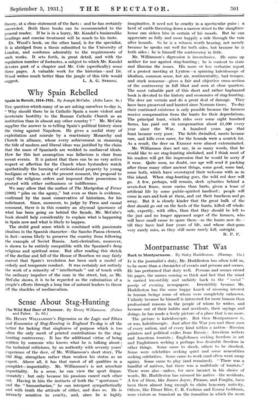Why Spain Rebelled
Spain in Revolt, 1814-1931. By Joseph McCabe. (John Lane. 613.) THE question which many of us are asking ourselves to-day is, " Why should there be in Catholic Spain a more violent and inveterate hostility to the Roman Catholic Church as an institution than in almost any other country ? " Mr. McCabe supplies the answer in re-telling Spain's political history since the rising against Napoleon. He gives a sordid story of exploitation and misrule by a reactionary Monarchy and Church in alliance, whose every achievement in stemming the tide of modern and liberal ideas was justified by the claim that the mass of Spaniards are wedded to mediaeval ideals. How far this last assumption was fallacious is clear from recent events. It is patent that there can be no very active respect or affection for the Church when bystanders watch apathetically the burning of ecclesiastical property by young hooligans or when, as at the present moment, the proposal to expel the religious orders and impound their possessions is greeted with either enthusiasm or indifference.
We may allow that the author of The Martyrdom of Ferrer (1909) " piles on the agony," but even so there is evidence, confirmed by the most conservative of historians, for his indictment. Since, moreover, to judge by Press and casual comment, there is in this country an abysmal ignorance of what has been going on behind the facade, Mr. McCabe's book should help considerably to explain what is happening in Spain now and what is likely to happen.
The stolid good sense which is combined with passionate idealism in the Spanish character—the Sancho Panza element, in fact—seems likely to preserve the country from following the example of Soviet Russia. Anti-clericalism, moreover, is shown to be entirely compatible with the Spaniard's deep religious and spiritual sense. But after reading this sketch of the decline and fall of the House of Bourbon we may fairly marvel that Spain's revolution has been such a model of orderly and temperate conduct. It was certainly not entirely the work of a minority of " intellectuals " out of touch with the ordinary impulses of the man in the street, but, as Mr. McCabe shows, it is to be regarded as the culmination of a people's efforts through a long line of natural leaders to throw off the shackles of mediaevalism.






























 Previous page
Previous page